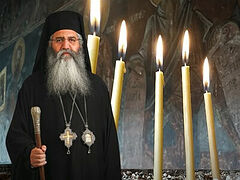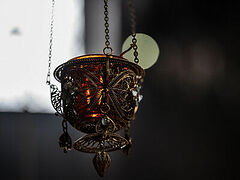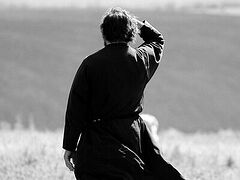Brethren, the Holy Gospel read at today’s Liturgy opened with the following words from our Savior: The lamp of the body is the eye. If therefore your eye is good, your whole body will be full of light. But if your eye is bad, your whole body will be full of darkness. If therefore the light that is in you is darkness, how great is that darkness! And… No one can serve two masters; for either he will hate the one and love the other, or else he will be loyal to the one and despise the other. You cannot serve God and mammon. The word of God is sharper than a two-edged sword; the word of God is life and life-giving. Naturally, Christ is a person—Christ is not the Bible, to make the point abundantly clear. And it is Christ, according to something wonderful I read from St. Nikolai of Zica, with whom we must be in love. And it is within His Church—the Holy Orthodox Church—that we must dwell. It is in the Church that we are sanctified and illumined and transfigured. It is within our capability to chose what we see, to chose what enters the heart through the eye filtered via the mind. If we continue to view all that is good or profitable for our souls—spiritual literature, wholesome endeavors perhaps, or good conversation that is beneficial for our spiritual and mental and intellectual progress—in short, if we realize that Apostolic maxim, whatever is true, whatever is noble, whatever is right, whatever is pure, whatever is lovely, whatever is admirable—if anything is excellent or praiseworthy—think about such things—if we live in such a way then we live for God, not man.
Each person has a particular vocation or talent, a particular mission within the Church, which is the body of believers existing in time and space and making the journey towards the Kingdom of Heaven. Yet we often spend our time sabotaging our own journey and destroying the home that we labored to build in paradise. In other words, we become our own worst enemies. This occurs because of our pride and vainglory, the fact that each one wants something in particular from the Church to suit his or her own needs and aspirations, which themselves are often rooted in individualistic tendencies that are by nature contrary to the mission of the Church. The Church is a unifying entity; the Church is not an entity that divides. Naturally, we must lay our ego and will aside at the door of the parish church in order to properly function in unity as one entity, as one body. This takes a particular quality called self-knowledge, which we spoke about extensively in the previous weeks. It also takes sincere, childlike faith. Yet, do we possess such an innocent, carefree faith by which we lay down all our wants and needs before the Heavenly Father as Christ commanded us to do in today’s Gospel?
The answer is, unfortunately, no. What are the signs of those who believe? Those who arrived in time for the Matins Gospel heard the Lord’s definition of how true, living faith affects believers: These signs will follow those who believe: In My name they will cast out demons; they will speak with new tongues; they will take up serpents; and if they drink anything deadly, it will by no means hurt them; they will lay hands on the sick, and they will recover. Here, a distinction must be made. Of course, there are those sick for whom holy men intercede, and these men and women, and even children, still die. There are also holy people who have died of poisoning. There are always exceptions to the rule, which God grants for the execution of His unfathomable Will. Nor does this mean we can feel free to literally take up serpents. True Faith, true Orthodoxy is not something that we seek to prove or test. No one should enter to test the immaculate faith, as one of the beautiful hymns of Lent teaches us. As corrupt men and women we are subject to the laws of corruption i.e., death, and in this life there is no skirting around this fact. The Church offers no solution to entering the grave, nor is longevity or good health promised to us as a guarantee. Yet, what is promised is a road. There is a road that Christ has opened and walked upon beyond the grave. And this is the Resurrection, which leads us to immortality. And this immortality is ours to have if we are faithful until the end, if we believe. And if we believe with purity of heart and sincerity then in certain instances the Lord will, through us, work His miracles in the world as they are defined in today’s Matins Gospel.
So, it is imperative that we seek a life worthy of this road being open to us upon our death. The Gospel at the Liturgy finished with these words from our Savior: Seek first the kingdom of God and His righteousness, and all these things shall be added to you. How do I seek first the Kingdom of God? I seek it where it can be visibly seen here on earth, within Holy Orthodoxy. I seek the Kingdom of God at the heart of the Church, that is, within the Holy Liturgy. I seek the Kingdom of God when I sincerely and not pretentiously repent of my sins in confession and receive Christ in the Holy Eucharist. I seek the Kingdom of God when I further the goals of the local parish I attend, when I build up the Body of Christ locally, when I keep my heart attentive to prayer throughout the week, when I assist my parish in ministry to the less fortunate; I seek God’s Kingdom when I am fully engaged in a Christocentric life. The Christ-centered life is full of challenges to be overcome. Yet I know from what the Apostle taught us at today’s Liturgy that we should collectively glory in tribulations, knowing that tribulation produces perseverance; and perseverance, character; and character, hope. Christians by definition are hopeful. We confess each Sunday during the Liturgy when we read the Creed that we look for, or we expect, or we hope for the Resurrection of the Dead and the life of the World to Come. Therefore, Christianity is in itself the definition of hope—the ultimate hope that death does not have the last say over our lives and the lives of those we love.
With the Feast of the Pre Eminent Apostles Peter and Paul tomorrow, we would do well to reflect on the courage the Apostles faced in the prospects of extreme failure and adversity. I would like, in closing, to quote extensively from the Apostle Paul who described his manifold trials so vividly in his second Epistle to the Corinthians:
Of the Jews five times received I forty stripes save one. Thrice was I beaten with rods, once was I stoned, thrice I suffered shipwreck, a night and a day I have been in the deep; In journeyings often, in perils of waters, in perils of robbers, in perils by mine own countrymen, in perils by the heathen, in perils in the city, in perils in the wilderness, in perils in the sea, in perils among false brethren; In weariness and painfulness, in watchings often, in hunger and thirst, in fastings often, in cold and nakedness.”
And we return to what must become a fact for my own parish, a small fledging mission here, in Canada. We are one of those Orthodox Churches in Canada and in the Western world at large who seek to spread Orthodoxy beyond the borders of the traditional Orthodox cultures. There is much through which we must persevere. And if we do not persevere, then no apostolic character can be built up. And it is this character that is a defining hallmark of Orthodoxy. Now, as we are on the threshold of the great feast of the Holy Apostles Peter and Paul, let us pray for their patronage in the difficult task of evangelization we face. And, inspired by their incredible endeavors with a Christ-sparked flame of zeal, let us go forth to the task at hand. Holy Apostles Peter and Paul, pray to God for us!




